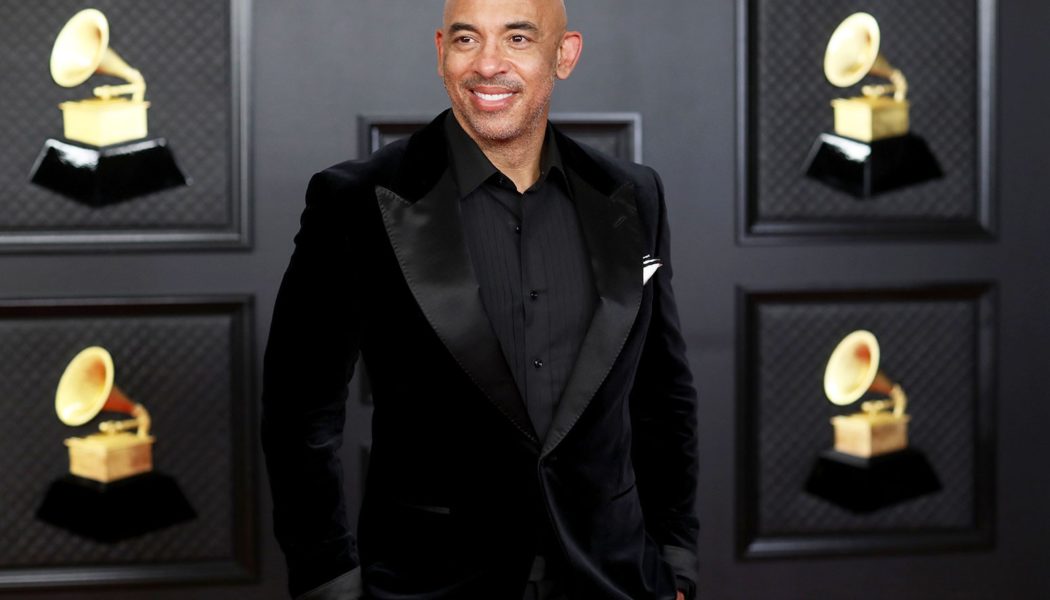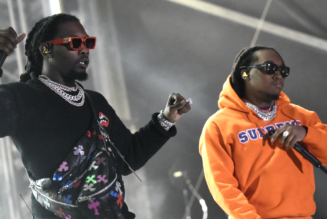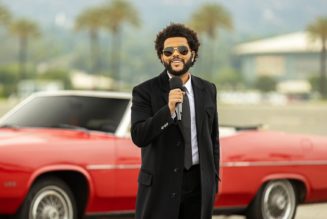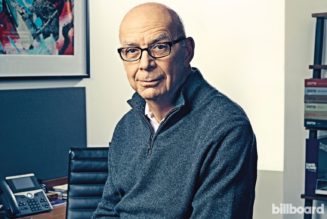
Still, he’s the first to admit there is plenty more progress to be made in his efforts to “modernize everything about the Academy,” including looking at new areas of revenue, making sure the Grammy voting process is as transparent as possible, and leading industry standards on diversity.
Mason started his tenure forged by fire, as chairman of the board of trustees he stepped into the interim president/CEO position in January 2020 after the Academy suspended his predecessor, Deborah Dugan, for alleged misconduct only five months after she’d been hired. Dugan, who was officially fired in March 2020, filed a complaint with the Equal Employment Opportunity Commission just days after being put on leave alleging sexual harassment, discrimination and improper business dealings by the Academy. The suit was settled this past May.
” I feel like we have moved on,” says Mason of the Dugan debacle. “There’s been so many changes since then… so many other things that are positive that we can talk about. I also think our energy really needs to be focused on what’s happening next.”
The biggest change so far during Mason’s tenure has been the landmark April 2021 decision to eliminate the Grammy Awards nomination review committees, which have long been maligned due to the committee members being kept secret and meetings happening in private. These groups launched in 1989 and ultimately grew to determine the nominees in 59 of 84 categories. Critics have said the committees made the process deliberately opaque and left room for potential conflict of interest.
Mason’s restructuring moves include streamlining the organization into three divisions. In August, longtime chief awards officer Bill Freimuth left the Academy after 17 years. On Friday (Sept. 17), the Academy promoted Ruby Marchand to chief awards and industry officer and Joanna Chu to vp of awards.
While work to bolster the diversity and inclusion within the Academy began before Mason took charge of the organization, he has put these issues at the forefront of his decision making — including linking with the online racial justice organization Color of Change, launching the Black Music Collective advisory group of music industry leaders, and continuing a voter drive to bring more underrepresented and current voters into the Academy (existing voters have to requalify to show they are still active in the music industry). Among the plans: Bring in 2,500 new women voters by 2025.
According to a 2020 report, the breakdown on voting members was 26% female, 69% male, 6% unknown; 25% “diverse,” 48% “non-diverse” and 27% unknown; and 25% under 40, 71% over 40 and 4% unknown. The Academy invited 2,321 people to join the Academy last year and another 2,710 this year. Of the new invitees, 48% were female and 48% male, with Black or African American invitees leading in ethnicity at 32%.
And yet, the progress is tempered with setbacks, including The Weeknd’s declaration last November that the Grammy Awards are “corrupt” after he received no nominations for the 2021 awards show and later said he’d asked his label, Republic Records, not to submit his music for future consideration. His words cast a pall over the March awards ceremony and became a running narrative.
As a notable songwriter and producer who has worked with Whitney Houston, Chris Brown, Justin Timberlake, Michael Jackson and many others, Mason says he comes to the CEO job first as a member of the creative community, making him uniquely positioned to understand the artistic viewpoint of many of the Academy’s members.
In a lengthy interview conducted by Zoom, Mason wanted to concentrate on the future, but he didn’t shirk from the Recording Academy’s past — which he has had a hand in shaping since 2009 when he joined as a national trustee. Beneath his calm demeanor lies a fierce competitor, a holdover from his days as a college basketball player at University of Arizona where his team went to the Final Four in 1988. He likes winning. When it’s mentioned that he and his father, Fourplay drummer Harvey Mason, are tied for five Grammy nominations each, he quickly retorted, “I don’t want to be tied. I think I have seven.” (According to the official Grammy database, he has five — but it turns out has father has 10.)
Mason says his three-year contract allows him to continue his creative endeavors, which recently included co-producing the Aretha Franklin biopic Respect, but it takes some careful time management. “I do Academy work all day until I’m tired in the evening,” he says, “and then I go create in the studio at night and work until I fall asleep.”
As the industry heads into Grammy season — the eligibility period ends Sept. 30 and first-round voting begins Oct. 22 — Mason spoke with Billboard from his home in Los Angeles about where the Academy is headed.
This interview has been edited for length and clarity.
During the CEO search you went on record saying you would say no if the board asked you to take the CEO job, but after the search firm went through more than 100 candidates, the board asked you to reconsider. What changed your mind?
All the passion and dedication and hard work that goes into the Academy from the staff rubbed off on me. We started some really great programs while I was interim and we made some really exciting changes. So when the board ultimately asked me to stay on, I was hesitant, but I spoke to my wife [and] my family, and I wanted to continue the important work that we were doing.
Shortly after you became CEO, you ceded the president title and named Valeisha Butterfield Jones, the Academy’s first chief diversity and inclusion officer, and former Berklee School of Music executive Panos A. Panay as co-presidents. Why did you alter the structure?
I knew we were trying to modernize everything about the Academy and the pace at which the industry is moving and evolving, I really felt that the structure would allow us to keep up and hopefully lead. People get caught up in the TV show and the awards, which are obviously very, very important, but for me, the big picture is how can we do more work for the music community? I’m a songwriter and producer, I’m around these people every day.
That also means having three people fill a role previously handled by one. Given that you’re a nonprofit, are you concerned that you’re too top-heavy now with salaries?
I think we’re talent-heavy. We’re always cognizant of the fact that we are a nonprofit and our mission is to service the members. How do we do that the most effective way? I don’t think it would make as much sense to be so concerned about saving every dime and not doing all that we could in the big picture so strategically I’m making sure we balance that.
The decision to eliminate the nominating review committees was heralded as a much-welcomed step towards transparency. Are there other ways that you’re seeking to be transparent with the Grammy voting process?
I would hope that at this point we are very transparent, but we’re always going to continue to try and refine it. It feels pretty straight-ahead, but we’ve got to do a better job of educating [and] pointing out exactly what the process is.
You also instituted the 10-3 policy. What effect will that have? [Members can now vote in up to 10 categories across three genre fields. That is down from 15 categories across all genre fields. All voters may also cast ballots in the general field, which consists of album, record and song of the year plus best new artist.]
It almost turns our general voting population of 12,000 people into miniature nomination reviews communities. If you’re an expert in R&B, whereas we used to have a small room of 20 to 30 R&B experts listening and reviewing every song, with the 10-3 voting, because you have to declare your areas of expertise, instead of 20 or 30, it’s going to be thousands who have declared R&B as their specialty area.
Does your accounting firm Deloitte tell you how many people vote?
They [haven’t] said that to me in the past, but they’re going to start saying that in the future…So my hope is that this next voting cycle will have real data and we’re know who’s voting, from where, from what genres, in what categories.
The Weeknd says his boycott of the Grammys will continue, even with the changes. Is there something to be learned from that incident in terms of how voting works and how you communicate with the artist community?
I’m not sure any communication would have fixed that situation. I do think we’ve got to keep looking at our voting process and we always want to recognize the best music of the year. I was disappointed by the whole situation. I was upset by it and I want to make sure that we, going forward, do this voting process and the awards process the best we can. We want to get it right. We’re going to make sure the people that are voting are the best that we can get.
This year’s Grammy Awards viewership dropped to 8.8 million, a 50 percent decrease from the year before. How concerned are you about that, especially as the show’s current contract with CBS ends in 2026?
I’d be lying if I said that I wasn’t concerned. We have to continue to make a great show. We have to make sure that it plays well with our partners on CBS because without that, we lose some of the revenue and the income that we put directly back into the music community.
Given that the vast majority of your operating budget to fund MusiCares and your education and advocacy efforts comes from the CBS deal, is there a Plan B if that money starts to diminish?
Absolutely. And that’s a lot of why you’re seeing some change within the organization at the leadership level. We have to make sure that we have people in place that can help us in ways that we need to grow and improve. There are a lot of things that are happening that I think will supplement how we generate money (Mason declined to give the percentage of the operating budget that comes from the CBS contract.)
The Academy of Country Music Awards will air off a major network next year for the first time in decades with their move to Amazon. Do you see the Grammys migrating off broadcast?
Right now, we’re in such great partnership with CBS, I think a lot of it would depend on how CBS wanted to evolve. If they have plans for expansion on the digital side, I’m sure we’ll work together to figure it out.
You were the first major awards show to announce an inclusion rider. It’s the production company’s job to implement that, so how do you hold them accountable? Why did you feel this was a necessary step?
Well, we write that check. That’s how we hold them accountable. I think it’s going to be in everyone’s best interest to make sure they work hard to collaborate with us on that rider. This rider codifies it, but it’s always going to be a part of what we’re doing. We want to set an example around what it looks like to be completely diverse and inclusive in everything that we’re doing.
When you announced your partnership with Color of Change last year, you said, “As the Academy continues its transformational journey, diversifying our industry is at the core of every decision.” Do you view the Academy as much more of an agent of industry change than perhaps past administrations have?
As the organization that represents all facets of the music industry, I do think we have a responsibility [and] an opportunity. I do see us maybe acting differently than we’ve acted before. The power of music, along with the platform that we have at the Academy, can be used to really make positive change. And that’s my hope.
You’ve made a lot of changes fairly quickly as interim and now permanent CEO. Do you feel like the Academy was broken before you took over?
I don’t think it was broken at all. I think it did incredible work. There are so many programs that were so important. We needed to improve and we needed to evolve. Things change so quickly, I felt that the Academy could build on what was there in the past, but think about what was coming in the future and make sure that we weren’t just being reactionary and were trying to lead. I didn’t think it was broken whatsoever, I just thought it could do more.
You started a partnership in March with Berklee College of Music and Arizona State University to guide you and the industry through diversity objectives. After you launched a joint survey two weeks ago, the Annenberg Inclusion Initiative came after you on Twitter saying the survey wasn’t a good use of money and that there are existing studies out there already showing inequity. Were you surprised by that broadside?
I was surprised because I think we’re all working towards the same goal. I want to put systems in place to get results. So if they disagree with our methods, I can respect that. But I do hope that we can all understand and realize that we are on the same side of making it more equitable and more fair and making sure that we’re getting to some sort of parity. We don’t have an agenda other than getting this right.
There are still some people in the Black music community who see the Academy’s actions toward racial parity thus far performative versus leading to sustainable change. Why do you think that perception is still out there?
I think their feelings are valid. I think they’re reasonable in what their complaints are. They have a history of things that maybe they feel disgruntled about and I respect that… I could understand them saying it was performative if we just did a couple of things and then stopped, but this isn’t changing and if you look at the moves we’re making, it’s all with the idea of being better, be more inclusive, more reflective and representative. We’re not asking anybody to give us a pat on the back yet or give us their seal of approval. But we’re going to work to earn it and it’s going to take us some time. But I strongly believe that we’re doing some really important change here and we’ll see how it goes.
Another complaint has been that the board of trustees has too much control and is entrenched in maintaining the status quo. This year, 18 of the 45 trustees were elected for the first time. Is that a good first step toward correcting that?
I think a good first step is to change the way that we constituted those trustees. That was done a year and a half ago, where instead of just the chapter sending representatives from the 12 different chapters, now we have the opportunity to have at-large seats, so that we can see what the board room is missing. We can make it more diverse and more balanced. As far as the board being entrenched, I can only speak for since I’ve been the CEO, the propensity of the board has been to be very supportive of change and transformation and the evolution of the Academy.
What’s it like working for the board that you used to run?
It’s very weird (laughs). I have a lot of great relationships with people on the board, and it’s just a different dynamic. There’s not a lot of separation between the people on the board and me. So I think that’s hopefully something that can work to our benefit.
What’s the update on the hiring in-house counsel? [The Academy has been criticized for having no in-house counsel and spending an average of $3 million a year on legal fees, but is in the process of hiring one.]
I think we will have a person in place within the next few weeks.
How does that change the relationship with Joel Katz (who is now at Barnes & Thornburg) and your attorneys at Proskauer Rose? [In her EEOC complaint, Dugan accused Katz of sexual harassment, a claim he denied.]
We’ve had different firms doing different things even beyond the two that you mentioned. And I think once we get the in-house counsel in place, we’ll evaluate where their strengths are, what are their skill sets… [and then] we’ll take a good look at who’s doing what for the Academy beyond our in-house counsel.
Joel is still counsel, right?
Joel is. There are new titles that will be coming out once we bring in-house counsel. People will be doing different things, but Joel is still involved, yes.
Is there a lingering stigma from the Deborah Dugan debacle?
I’m not sure. Maybe [people] don’t want to talk to me about it, but I feel like we have moved on. There’s been so many changes since then… so many other things that are positive that we can talk about. I also think our energy really needs to be focused on what’s happening next. So my hope is that we moved on, but I can’t speak for the rest of the industry.
In your first 20 months as CEO, what have been the low and high points for you?
The high points are just the small, little baby steps that we make every day…To be better on a day-to-day basis is what makes me excited. The low point has been seeing our music community so devastated by COVID-19 and the level of need that was there. Another low point would be any time the Academy is called into question as far as our motives or our agenda. I’ve been involved in this organization for a long time and I can honestly say that there is no other agenda other than to do things right and to serve our community.









